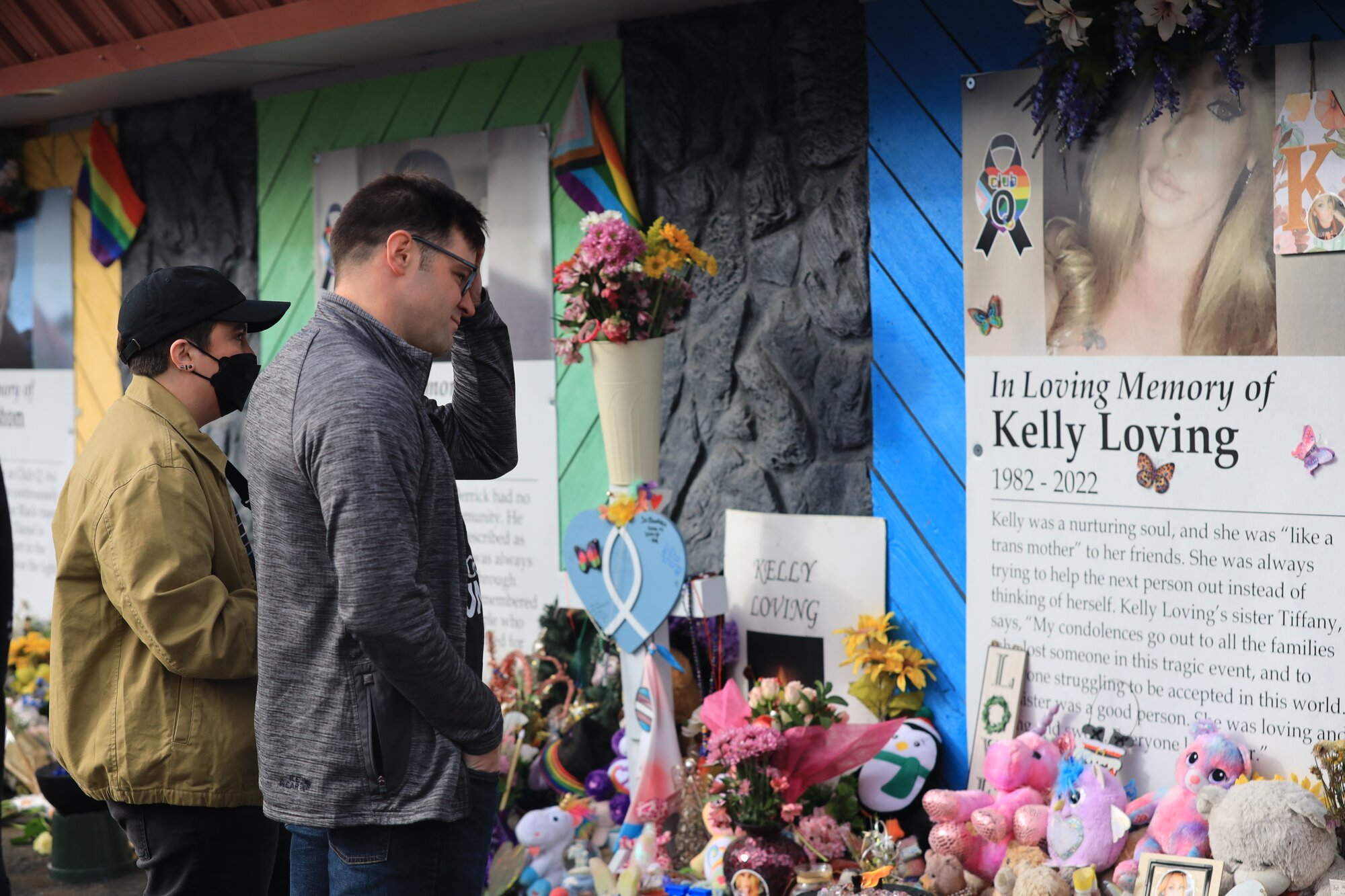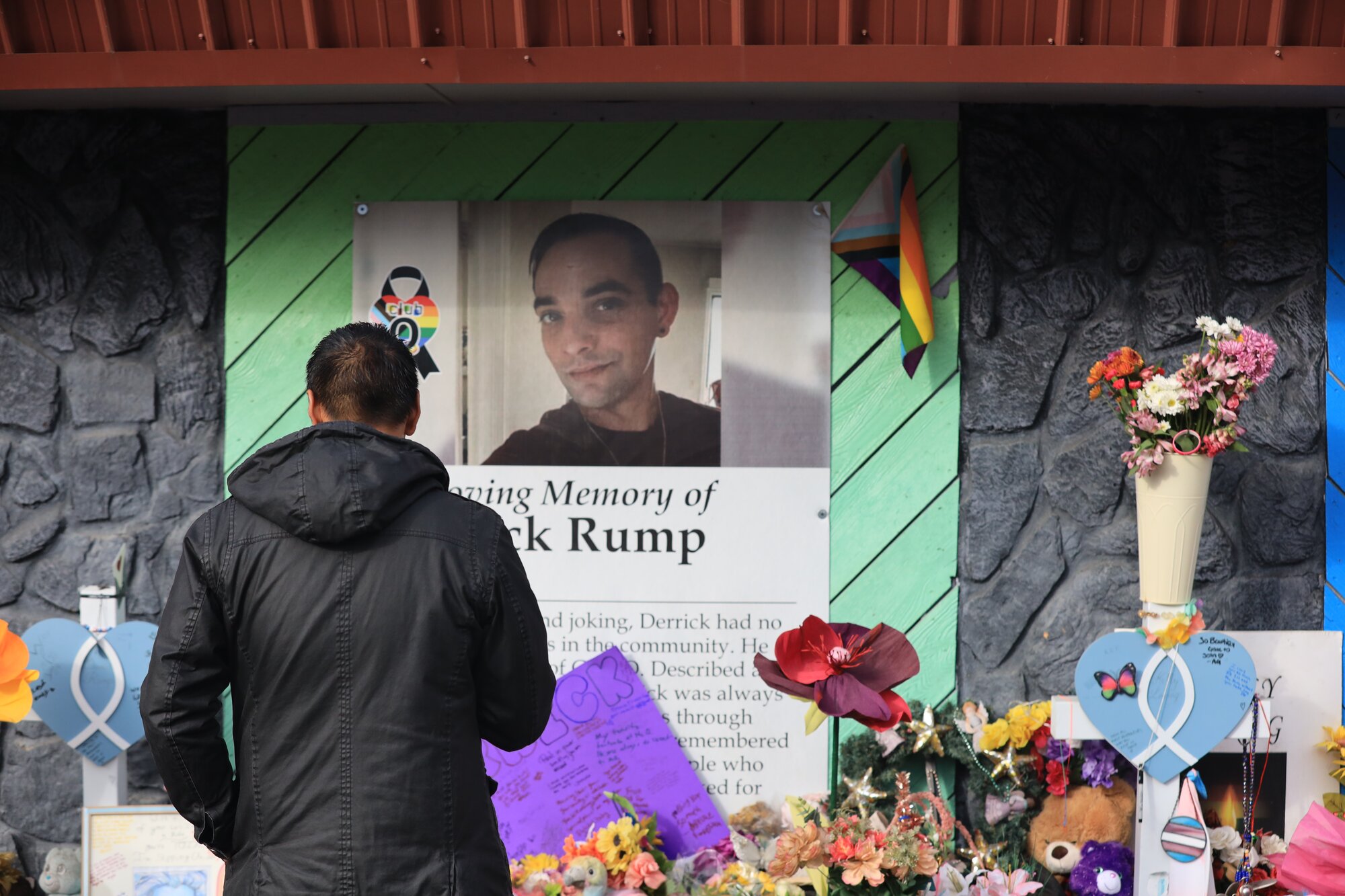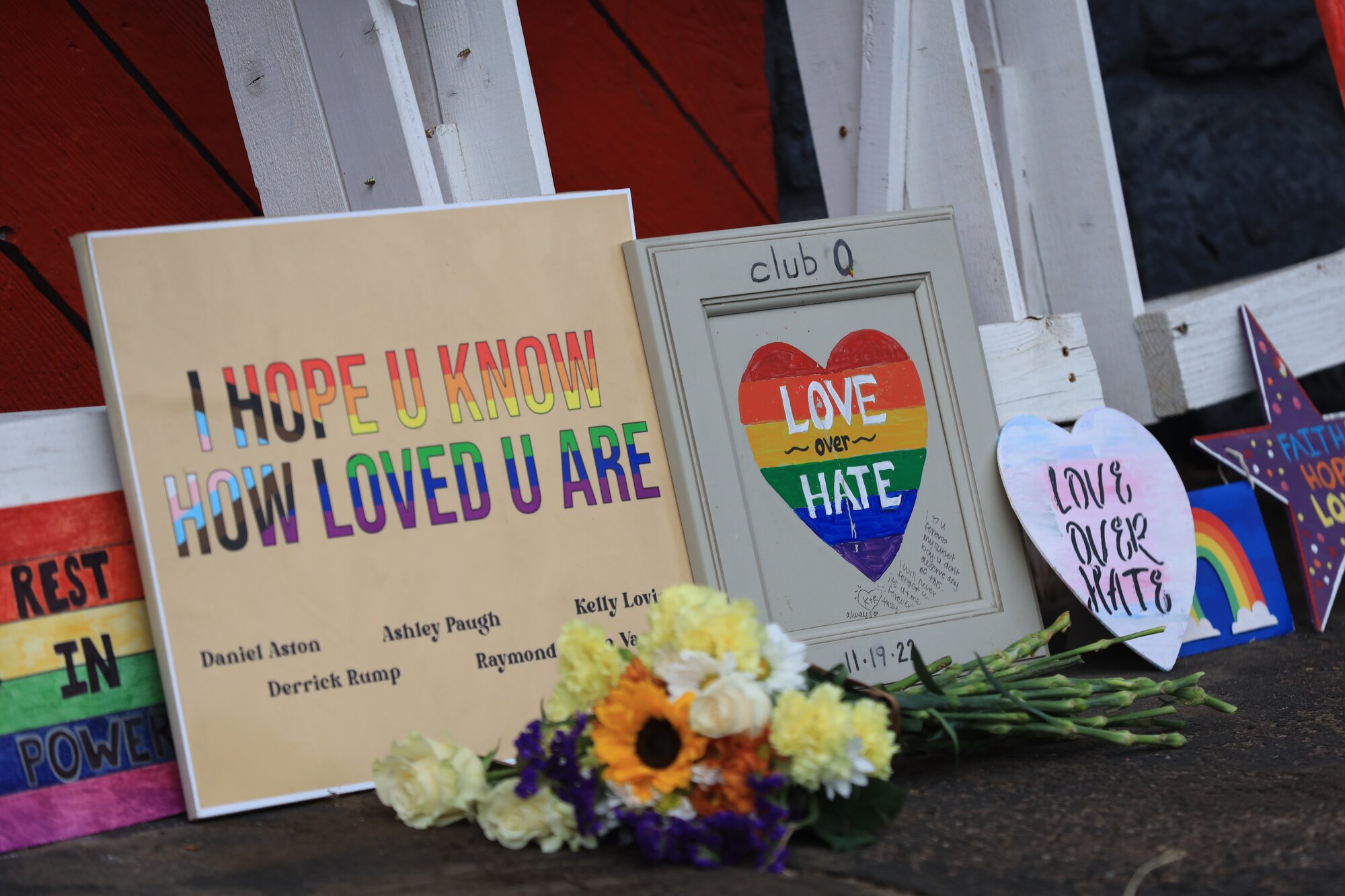1 year after Club Q shooting, survivors reflect on lives lost and progress to be made

COLORADO SPRINGS, Colo. — Daniel Aston wrote poetry and loved finding shapes in the clouds. Derrick Rump was full of life, attitude and sass — in all the best ways. Ashley Paugh loved her family and treated the foster children she worked with like children of her own. Kelly Loving was a fierce advocate for other transgender people in Colorado Springs. Raymond Green Vance loved football and hoped to join the United States Air Force.
These were some of the memories shared with Rocky Mountain PBS by friends and family on the one-year mark since a gunman took five lives at Club Q, an LGBTQ+ nightclub in Colorado Springs.
“I’m going to have to remember them for longer than I knew them,” said Hysteria Brooks, a Colorado Springs drag queen who frequently performed at Club Q. “And that’s hard to swallow.”
Aston’s partner, Wyatt Kent, said the two had a “whirlwind love.” They were together nearly five months before Aston’s death, but Kent said they would have certainly been married by now. Aston bartended at Club Q while Kent performed, and the two shared poetry and left notes for each other around the club.
Kent celebrated his birthday Nov. 19, only hours before the shooting. Aston — performing as drag queen Potted Plant — left a handwritten birthday card backstage at Club Q for Kent
Kent finally got to read the note weeks later, when police returned it to him after collecting it as evidence for their investigation.
“I feel Daniel constantly at all times, but especially when the sunlight peaks through the clouds,” Kent said. “Daniel and I had this whirlwind love, it was poetic, it was a hallmark, it was spectacular.”
Ashley Paugh’s sister, Stephanie Clark, said Paugh — who visited Colorado Springs from La Junta — would have helped the shooter through his mental health struggles. Paugh dedicated her life to working with foster children and had a passion for helping those who needed it.
“She had so much love and she loved her kids and those foster kids,” Clark said. “I’m just hoping those foster kids are having a great Christmas because that’s what she would want.”
Kent said he dodged several bullets that night and that Kelly Loving jumped in front of him to save his life, ultimately sacrificing her own.
“So many beautiful trans bodies that saved us that night,” Kent said, noting the shooting took place on the eve of Transgender Day of Remembrance.

A tribute to Kelly Loving outside Club Q.
Photo: Chase McCleary, Rocky Mountain PBS
A new normal
Ashtin Gamblin was exhausted by the time Anderson Lee Aldrich came to the door she was watching. Her job at the time was “door girl,” she said.
“I really just wanted to go home,” Gamblin said. “I know that sounds bad, but it was almost midnight and I wanted to go home.”
She had just asked Aston a question when she heard rounds of gunfire pop. The attack was sudden, leaving most Club Q patrons scrambling during a moment they had hoped to never find themselves in. Aldrich killed five people and injured dozens more before Thomas James and Richard Fierro subdued Aldrich, who was later sentenced to life in prison.
On the 19th and 20th of each month, Gamblin is constantly reminded of the attack. The one-year mark felt particularly difficult.
“This anniversary has been the hardest and there’s almost no way to describe what's gone through my head other than I’m just taking it day by day and hoping that I actually remember how to be an adult in the process,” Gamblin said. “It doesn’t necessarily matter how long it’s been, we’re still learning and figuring out where to go from here.”
Michael Anderson was bartending during the shooting and sustained chiropractic injuries. He said as the one-year marker approached, his dreams turned to nightmares. The tragedy replayed in his head.
“I continue to have dreams and subconscious moments that are being triggered by what happened,” Anderson said.
Anderson found his friend and fellow bartender, Derrick Rump, dead on the floor just five minutes after the two were pouring drinks together.
Rump, Anderson said, was “sassy” on the outside but had a heart of gold.
Weeks before the shooting, Anderson had troubles with his car, and said Rump took him to and from work and helped him run errands.
“It was little things like that that define somebody, willing to do that without ever asking for something or complaining.” Anderson said.
The night before the shooting, Rump sported a pink hat behind the bar. Anderson complimented the hat and said it would match his outfit, so Rump autographed it with his name and an “inappropriate image,” before handing it off to Anderson.
“At the time, it was just a hat. But to know what would happen a day later, it's a lot more than that,” Anderson said.
He still has the hat.

A tribute to Derrick Rump outside Club Q.
Photo: Chase McCleary, Rocky Mountain PBS
When the world keeps going
Tiara Kelley often asks herself how she can move through life after being so close to a second mass shooting.
Kelley frequently performed at Pulse, the LGBTQ+ nightclub in Orlando, Florida where a shooter killed 49 people and wounded dozens more in 2016. Kelley moved to Colorado for a fresh start after knowing many who were victims at Pulse.
She also performed at Club Q the night before the shooting.
“To move to a whole other state, a whole other city across the country and have to experience this again in a place that I happen to perform at and consider to be a safe space, it really sent me into a place of numbness and fear,” Kelley said. “For a very long time this year, I’ve had fear of my existence. It has controlled me.”
Kelley still performs drag but said doing so often brings bouts of panic so strong that she waits outside venues for the whole night until it’s her turn to perform.
“I don't have that ability to enjoy anything anymore,” Kelley said. “Two times that I’ve very nearly avoided being actually there during a mass shooting, and I think to myself, ‘would I be that lucky the third time?’”
People and buildings
Club Q was grimy. The lighting was dark, the floors were sticky, the music was loud and the drinks were strong.
Its employees wanted it exactly the way it was: a place for those who didn’t fit the mold.
“I’ve kind of felt that I’ve always been an outcast myself, and I walked into that bar and was absolutely just loved, doted on, supported,” Gamblin said. “There was just never a question of doubt that you belonged there. If you showed up, you belonged there.”
Club Q opened in 2002, more than a decade before same-sex marriage was legalized in all 50 states. Those who attended the club for years said it was a safe space when they had no other, particularly in Colorado Springs, which has a history of hostility toward the LGBTQ+ community.
“It was somewhere that everyone could fully be themselves without any form of judgment,” Gamblin said. “You were 100% open and supported to dress how you wanted to dress, dye your hair, have tattoos, whatever.”
Hundreds gathered outside Club Q on Sunday for a memorial celebrating the lives of those lost, as well as those grieving and mourning. Colorado Gov. Jared Polis, Colorado Springs Mayor Yemi Mobolade and Club Q owner Matthew Haynes delivered remarks about resilience and the importance of community.
Gamblin and other survivors confronted the governor after his remarks, telling him Colorado’s hate crime statute being a misdemeanor offense is “unacceptable.” Polis asked them to schedule an appointment with his staff.
Haynes said the bar has existed as an affirming space for more than half of his life and returning it to the community is essential.
“You walked through these doors and it didn’t matter who you were,” Haynes said. “These were your friends and this was your chosen family.”
But some survivors said Haynes’ words rang hollow.
“There's a heavy division in the aftermath of all of this and seeing ownership of this club spread rumors, lies and vitriolic hate about survivors directly,” Kent said.
Haynes maintained the importance of reopening Club Q as it once existed: a dance club for LGBTQ+ people. That goal could be years away, and in the meantime, he and bartender Michael Anderson — who bartender the night of the shooting — are opening a lounge inside the Satellite Hotel in southern Colorado Springs, where Haynes already owned property.
The lounge will be called The Q and is slated to open this winter. It will be an 18+ space with board games, billiards and a bar. The Q is a lounge, Haynes said, and will not have the same dance club atmosphere Club Q was famous for.
“We’re missing a place while we’re grieving those we’ve lost, and some of us are grieving a place to go,” Haynes said. “There's a whole generation that hasn’t even come out yet that needs a venue like this.”
As for reopening the club in its same spot, Haynes said several families of victims have told him they believe this is what their loved ones would have wanted.
“It’s celebrating their lives and celebrating what was important to them,” Haynes said. “The majority of families have told us to reopen.”
But survivors, frequent club patrons and LGBTQ+ activists questioned Haynes’ intention to reopen the club at the spot where so many have deep trauma. As for the lounge, people like Kent and Brooks said it felt more like a “cash grab” than an attempt at rebuilding community.
“All Club Q did was hold four walls. The people made the community,” Brooks said. “That’s what makes a community. Not a building.”
Haynes said he has also used the money raised in a GoFundMe to support building a memorial on site of the club, though construction on the memorial has not started yet. Haynes said the delay is due to miscommunications and bureaucracy with the Colorado Springs Planning Commission.
Those affected by the shooting said the money was raised with their names and stories, and therefore should be paid to them. Many said they’ve struggled to pay medical bills, rent and other necessities in the aftermath of the tragedy.
Most said working a full-time job is too difficult with the mental anguish they face, so they are often stuck pooling mutual aid money or living off minimal support from the Colorado Healing Fund, which took months to distribute donations to survivors.
“It’s the victims' money and they’re entitled to 100% of it,” said Z Williams, co-founder and co-director of Bread and Roses law, a Denver-based law firm that focuses on social justice movements. “There’s just a lot of questions about where that money raised by Club Q has gone and why is there still fundraising happening in the name of the employees if no further funding is coming to them.”
The conflict between those in support of Haynes and his plans and those who feel taken advantage of by the club owner has created riffs between former friends, Anderson said.
“I think rebuilding a community after a tragedy is a difficult task, but what we’re experiencing now is a community divided, a community completely in disagreement on the path forward and what does that look like,” Anderson said. “I think there’s a lot of hurt and pain and lack of trust in each other.”

Supportive signs sit outside Club Q as community members grieve the deaths of five shot and killed in a mass shooting at the Colorado Springs LGBTQ night club.
Photo: Chase McCleary, Rocky Mountain PBS
Pushing forward
Those who called Club Q home were adamant that the club was simply a brick-and-mortar space. It was the people inside who made the community.
“For a lot of us, we all kind of shared the sentiment that it was really never about the building itself, it was about the people you were with,” Gamblin said. “For us, it’s more so the focus of being with each other and just having that support system with you.”
Colorado Springs has one other “official,” LGBTQ+ bar. ICONS, which sits on a corner in Downtown Colorado Springs, touts itself as a New York City-style piano bar in which all bartenders sign to patrons throughout their evenings. While those associated with Club Q said having another LGBTQ+-dedicated space is nice for the city, those who use these spaces have found power in existing with each other without needing one specific businesses’ help.
“As a community here in Colorado Springs, we always have a lot of work to do, but we, the community, have the most powerful ability to create spaces for ourselves. We don't have to rely on some sad millionaire who’s running out of money to open up a lounge in a hotel that he already owns,” Kent said. “We, the community, are strong enough to find spaces to uplift ourselves.”
Alison Berg is a reporter for Rocky Mountain PBS. alisonberg@rmpbs.org.
For resources related to the Club Q shooting, visit this link.